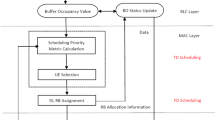Abstract
The EUTRA network offers significant data throughput rate. In this paper, we study and investigate the performance of Proportional Fair (PF) algorithm for media access control scheduler in Long Term Evolution (LTE) network and proposed an Optimized Proportional Fair (OPF) Algorithm. Furthermore, we implemented both algorithms and measured Key Performance Indicator (KPIs) as UE throughput (peak, average, and edge), average spectral efficiency and Fairness Index. On comparing the performance of proposed OPF algorithm with existing PF algorithm , we observed that on decreasing resource distribution by 14–15% in PF algorithm, proposed OPF algorithm show improvement of 4.7% in spectral efficiency, 54% in UE Peak level throughput, 15% in UE Average throughput, 15% in cell average throughput and degradation of 7% margin in UE Edge throughput. In this paper, we conclude that proposed OPF algorithms improve the performance of LTE EUTRA network. As the further scope of work, we suggest improving the performance of the UE at edge level throughput.







Similar content being viewed by others
References
3GPP: The mobile broadband standard: LTE advance [Online]. http://www.3gpp.org/technologies/keywords-acronyms/97-lte-advanced. Accessed 28 Oct 2015.
Capozzi, F., Piro, G., Grieco, L. A., Boggia, G., & Camarda, P. (2013). Downlink packet scheduling in LTE cellular networks: Key design issues and a survey. IEEE Communications Surveys & Tutorials, 15(2), 678–700.
Kawser, M. T., Farid, H. M. A. B., Hasin, A. R., Sadik, A. M. J., & Razu, I. K. (2012). Performance comparison between round robin and proportional fair scheduling methods for LTE. International Journal of Information and Electronics Engineering, 2(5), 678–681.
Djouama, A., & Lim, M.-S. (2015). Reduction of the feedback delay effect on a proportional fair scheduler in LTE downlink using nonlinear. AEU International Journal of Electronics and Communications, 69(10), 1393–1402.
Saxena, A., & Sindal, R. (2016). Performance analysis of MAC scheduler in LTE (EUTRAN) for “ASAR”: Resource allocation. In Next generation mobile applications, services and technologies (NGMAST 2016), Cardiff UK, 2016.
Barayan, Y., & Kostanic, I. (2013). Performance evaluation of proportional fairness scheduling in LTE. In World congress on engineering and computer science 2013 (Vol. II), San Francisco, USA, 23–25 Oct 2013.
Saxena, A., & Sindal, R. (2017). Comparative performance analysis of different resource scheduler and characterizing the impact of proportional fair under different TTI feedback delay in EUTRA network. Inderscience Journal International Journal of Mobile Network Design and Innovation, 1–11.
Lee, S.-B., Pefkianakis, I., Meyerson, A., Xu, S., & Lu, S. (2009). Proportional fair frequency-domain packet scheduling for 3GPP LTE Uplink. In IEEE conference, Rio de Janeiro, Brazil, 2009.
Schwarz, S., Mehlfuhrer, C., & Rupp, M. (2010). Low complexity approximate maximum throughput scheduling for LTE. In IEEE AsilomarSSC, Asilomar, 2010.
Zulhasnine, M., Huang, C., & Srinivasan, A. (2010). Efficient resource allocation for device-to-device communication underlaying LTE network. In 2010 IEEE 6th international conference on wireless and mobile computing, networking and communications (WiMob), Niagara Falls, NU, Canada, Canada, 11–13 Oct 2010.
Kwan, R., Leung, C., & Zhang, J. (2009). Proportional fair multiuser scheduling in LTE. IEEE Signal Processing Letters, 16(6), 461–464.
Ma, Z., Xiang, W., Long, H., & Wang, W. (2011). Proportional fair resource partition for LTE-advanced networks with type i relay nodes. In 2011 IEEE international conference on communications (ICC) (IEEE ICC), June 2011.
Saxena, A., & Sindal, R. (2016). Analysis of cell reselection in evolved UMTS radio access network radio resource management. In 2nd IEEE international conference on engineering and technology, Coimbatore, TN, India, 17–18 Mar 2016.
Saxena, A., & Sindal, R. (2016). Characterizing the effect of N-CoMP and CoMP with interference in LTE-A. In International conference on computer communication and informatics ICCCI 2016, Coimbatore India, 2016.
Saxena, A., & Sindal, R. (2017). Performance analysis of up-link adaptation in EUTRAN. Actapress Journal - International Journal of Communications, 5(1), 1–7.
Li, J., Zhao, Y. Q., Yu, F. R., & Huang, X. (2015). Queueing analysis of two-hop relay technology in LTE/LTE-A networks with unsaturated and asymmetric traffic. IEEE Internet of Things Journal, XX(YY), 1–8.
Khirallah, C., Vukobratovic, D., & Thompson, J. (2012). Performance analysis and energy efficiency of random network coding in LTE-advanced. IEEE Transactions on Wireless Communications, 11(12), 4275–4285.
Saxena, A., & Sindal, R. (2016). Performance analysis of proportional fair MAC scheduler under varying feedback delay in EUTRAN. Actapress Journal -International Journal of Communications, 4(1), 1–8.
Wu, S.-J., & Chu, L. (2011). A novel packet scheduling scheme for downlink LTE system. In 2011 Seventh international conference on intelligent information hiding and multimedia signal processing, Dalian, China, 14–16 Oct 2011.
"System Level Simulator Institute of Telecommunications,” Vienna University of Technology, Austria, 2015. [Online]. http://www.nt.tuwien.ac.at/ltesimulator. Accessed 30 May 2017.
Jain, R. K., Chiu, D.-M. W., & Hawe, W. R. (1984). A quantitative measure of fairness and discrimination for resource allocation in shared computer system. In ACM transaction on computer systems, no. DEC-TR-301, pp. 1–36, 1984, Sep 26.
Saxena, A., & Sindal, R. (2016). Strategy for resource allocation in LTE-A. In IEEE international conference on signal processing, communication, power and embedded system (SCOPES)-2016, Centurion University of Technology and Management (CUTM), Paralakhemundi Campus, Orissa India., 03–05 Oct 2016.
Author information
Authors and Affiliations
Corresponding author
Ethics declarations
Conflict of interest
The authors declare that they have no conflict of interest.
Rights and permissions
About this article
Cite this article
Saxena, A., Sindal, R. Performance Analysis of Optimized Proportional Fair Media Access Control Scheduler in Evolved UMTS Radio Access (EUTRA) Network. Wireless Pers Commun 98, 1285–1298 (2018). https://doi.org/10.1007/s11277-017-4919-3
Published:
Issue Date:
DOI: https://doi.org/10.1007/s11277-017-4919-3




